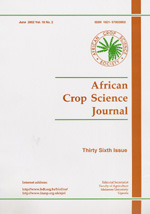
|
African Crop Science Journal
African Crop Science Society
ISSN: 1021-9730
EISSN: 1021-9730
Vol. 14, No. 2, 2006, pp. 83-91
|
 Bioline Code: cs06008
Bioline Code: cs06008
Full paper language: English
Document type: Research Article
Document available free of charge
|
|
|
African Crop Science Journal, Vol. 14, No. 2, 2006, pp. 83-91
| en |
Banana Bacterial Wilt Incidence in Uganda
Kagezi, G.H; Kangire, A; Tushemereirwe, W; Bagamba, F; Kikulwe, E; Muhangi, J; Gold, C.S & Ragama, P
Abstract
Among the main constraints in banana production in Uganda is the Banana Bacterial wilt (BBW) disease. The disease has spread widely but knowledge of its incidence at farmer level is lacking. Recommended disease management/control measures are mainly targeting farm level agronomic practices. This study aimed at establishing the knowledge gap to enhance their effectiveness. The objectives were to assess the role of the different clones in the spread and transmission of BBW and whether farmers were removing male buds from bananas as a control option for the disease. Data were collected on farmers' fields. Disease incidence was highest in Kayunga, Kamuli and Masindi followed by Mbale and Luwero and lowest in Mubende, Bushenyi and Ntungamo. In all districts, the most important clones were cooking bananas, kayinja and kivuvu. Results indicated that disease incidence was highest on Kayinja and lowest on cooking bananas. The sample size for the other clones was low for a conclusion to be drawn. The disease was first observed in Kayunga and Kamuli and as far back as 2000 but most of the farmers reported that they first observed the disease between 2003 and 2005. Most farmers reported that they were cutting off the male buds in a sporadic manner and when they were moderately old and using cutting tools. Farmers were reluctant to cut off male buds from Kayinja and Kivuvu. In conclusion, most farmers had heard about BBW though more sensitization needs to be done especially about the control measures.
Keywords
Debudding, Musa sp. Xanthomonas
|
| |
© Copyright 2006 - African Crop Science Society
|
|
